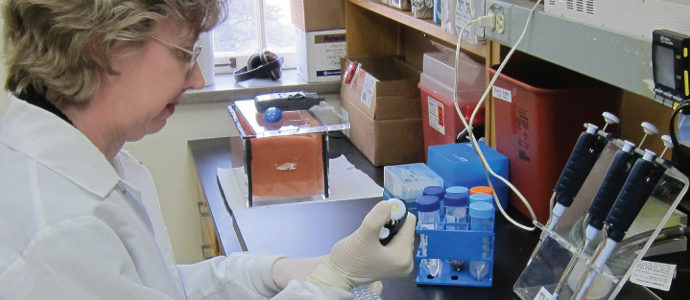Last week researchers at VIB Leuven in Belgium published evidence that a brain pathway involving the protein APP (Amyloid Precursor Protein) plays a vital role in development of Fragile X syndrome, one of the most common causes of autism. Scientists led by Dr. Emanuela Pasciuto in the laboratory of Prof Claudia Bagni published findings of their study in the journal Neuron.
Read moreamyloid precursor protein
Ab-Mediated Translation in Fragile X Syndrome

With a $120,000 grant from FRAXA Research Foundation during 2011-2012, Dr. Cara Westmark at the University of Wisconsin explored the role of AbPP as a potential treatment option for fragile X. AbPP produces b-amyloid which is over-expressed in Alzheimer’s disease (AD) and Down syndrome.
Read moreCompound that Inhibits mGluR5 Corrects Signs of Fragile X in Adult Mice
A study finds that a new compound reverses many of the major symptoms associated with Fragile X syndrome (FXS). The paper is published in the April 12 issue of the journal Neuron, describing the exciting observation that the FXS correction can occur in adult mice, after the symptoms of the condition have already been established. Previous research has suggested that inhibition of mGlu5, a subtype of receptor for the excitatory neurotransmitter glutamate, may ameliorate many of the major symptoms of the disease. This study, a collaboration between a group at Roche in Switzerland, led by Dr. Lothar Lindemann, and Dr. Mark Bear’s MIT lab, used an mGlu5 inhibitor called CTEP to examine whether inhibition of mGlu5 could reverse FXS symptoms.
Read moreRole of JNK in FMRP Regulated Translation in Fragile X Syndrome

With a $90,000 grant from FRAXA Research Foundation over 2 years, Dr. Michael Wilhelm and his team at the University of Wisconsin studied a protein known as JNK, which is observed to be abnormally regulated in Fragile X. Like FMRP, it is involved in regulating dendritic protein synthesis, and so it may be a target for drug therapy in Fragile X.
Read moreUsing Fenobam to Reduce APP and Abeta in Fragile X Mice

With a $130,000 grant from FRAXA Research Foundation over 2008-2009, Drs. James Malter and Cara Westmark at the University of Wisconsin studied the relationship between the Fragile X protein FMRP and APP, a protein important to the pathology of Alzheimer’s Disease. APP may also contribute to the pathology of Fragile X, and its major metabolite, Aß, may contribute to abnormal protein synthesis via a positive feedback loop. This project sought to restore normal dendritic protein synthesis in Fragile X mice by breaking into this loop.
Read more
